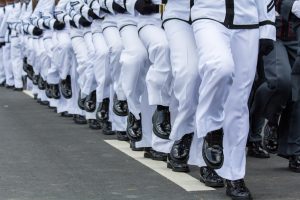After a landslide electoral victory on May 9, Ferdinand “Bongbong” Marcos Jr. will become the 17th president of the Philippines. During campaign debates, Marcos said that he rejects the “Cold War” model imposed by the great powers – the United States and China – carving their regions into spheres of influence.
This comment was made in the context of Manila’s struggle for “effective government control” in the West Philippine Sea, as the Philippines refers to its claimed portion of the South China Sea. In July 2020, Washington supported Manila’s international arbitral award against China’s intention to establish a “maritime empire” within the “first island chain.”
Marcos has also expressed his admiration for incumbent President Rodrigo Duterte’s controversial “independent foreign policy” and wishes to continue that policy for the next six years. International relations scholars have debated whether the Duterte administration was balancing against China with the U.S., bandwagoning with China away from the U.S., or hedging between the two powers. As things unfolded, however, none of these models could fully explain Manila’s behavior in the Indo-Pacific.
Instead, the Duterte presidency gave rise to the concept of “Philippinedization” – a “process whereby a weaker state, backed by a powerful country, goes through great lengths in temporarily refraining from opposing a neighboring great power by resorting to economic and diplomatic rapprochements at the strategic level but strengthening its national security infrastructure on the operational level with an eye for potential conflict in the foreseeable future.” As it becomes more likely that the great powers will employ conventional military force at some point in the future, Duterte’s successor must take a long view in rethinking Philippine defense and deterrence.
During the electoral debates, Marcos may have sensed the limits of engaging China despite rejecting the “Cold War” model. Although he described diplomacy as the “correct approach” to the South China Sea disputes, he also acknowledged a harsh reality: the country needs a military presence there to demonstrate to Beijing that Manila intends to defend its claimed maritime spaces. Whether or not this is lip service to satisfy the top circles of the Armed Forces of the Philippines (AFP), Marcos will likely be compelled to complete the AFP Modernization Program (AFPMP) due to domestic and international pressures.
Duterte was placed in a similarly awkward position. Back in 2016, he expressed his preference that the military revert to internal security operations (ISO) and even that it support his controversial “war on drugs.” But years later, the Duterte administration instead threw its support behind AFPMP Horizon 2, which is focused on the military’s transition from ISO to external defense. This goes to show how far the AFP and its goals have become institutionalized, even as it managed to maintain cozy relations with its commander-in-chief.
To preserve the country’s national interest and his political survival, Marcos Jr. should push for the completion of the AFPMP Horizon 3, which is purely focused on external defense and is scheduled to run from 2022 to 2028. Last month, incumbent Defense Secretary Delfin Lorenzana expressed his hopes that the next government would support the AFP’s wish to bring in “more sophisticated equipment,” by specifically pushing for more funding on defense acquisition. The procurement of diesel-electric submarines, corvettes, frigates, offshore patrol vessels, multirole jet fighters, light tanks, multidomain-based missile batteries, and air defense systems are a few big-ticket items included in the third stage of AFPMP.
Moreover, it should work alongside cyber, space, and electronic warfare tools for intensifying command, control, communication, computers, intelligence, surveillance, target acquisition, and reconnaissance to boost joint operations for the multidomain threats that may accompany future forms of warfare. As I have pointed out elsewhere, defense acquisition should be guided by nothing less than the need to deter or win future wars.
The Marcos administration must also address the logistical challenges of fully realizing the AFPMP. Last October, President-elect Marcos expressed the need to modernize the country and transform it into “the next logistics hub in Asia,” through automation, computerization, and artificial intelligence. He would do well to include the AFP’s intention to transform Pag-Asa (Thitu) Island into a military logistics hub consistent with his view of maintaining a military presence in the Philippine-claimed regions of the South China Sea.
However, maintaining a lone military presence on the island alone will not forestall Beijing’s goal of dominating the regions within the “first island chain.” In other words, the Philippines may need help by coordinating with Washington and its allies. For instance, Marcos may need to recognize the real benefit of implementing the Enhanced Defense Cooperation Agreement (EDCA) with the U.S., providing a logistical-tactical-operational leg for American military assistance in case of an armed attack against Filipino vessels and aircraft by external aggressors. So far, the Biden Administration recently expressed that it is “looking forward in strengthening the U.S.-Philippine Alliance” alongside other nontraditional security issues.
The Marcos administration must consider supporting the AFPMP while there is still time. Support would mean prioritizing external defense, not just in acquisition but also in training, education, and leadership, with the aim of developing a modernized strategic culture. In strategic affairs, personnel matter most. The next president should not also politicize defense acquisitions, which may affect the performance of future assets, such as the recent issue with the Jose Rizal-class frigates. Moreover, it would mean political leaders collaborating with the military and diplomatic corps in defining its “theory of victory” so that capabilities must affect decision-making at the policy level. It boils down to whether or not the Marcos administration can craft a well-suited national security strategy that embodies the Philippines’ enduring national interests.































